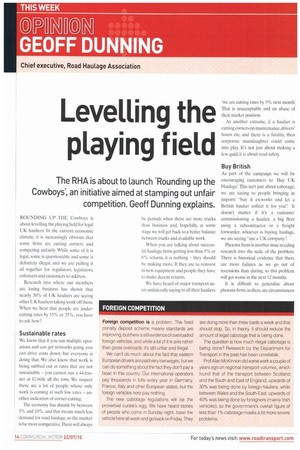FOREIGN COMPETITION Foreign competition is a problem. The fixed penalty
Page 14

If you've noticed an error in this article please click here to report it so we can fix it.
deposit scheme means standards are improving, but there is still evidence of overloaded foreign vehicles, and while a lot of it is axle rather than gross overloads, it's still unfair and illegal.
We can't do much about the fact that eastern European drivers are paid very low wages, but we can do something about the fact they don't pay a bean in this country. Our international operators pay thousands in tolls every year in Germany, France, Italy and other European states, but the foreign vehicles here pay nothing.
The new cabotage regulations will be the proverbial curate's egg. We have heard stories of people who come in Sunday night, base the vehicle here all week and go back on Friday. They are doing more than three loads a week and that should stop. So, in theory, it should reduce the amount of legal cabotage that is being done.
The question is how much illegal cabotage is being done? Research by the Department for Transport in the past has been unreliable.
Prof Alan McKinnon did some work a couple of years ago on regional transport volumes, which found that of the transport between Scotland and the South and East of England, upwards of 30% was being done by foreign hauliers, while between Wales and the South-East, upwards of 40% was being done by foreigners (mainly Irish vehicles), so the government's overall figure of less than 1% cabotage masks a lot more severe problems.
























































































































